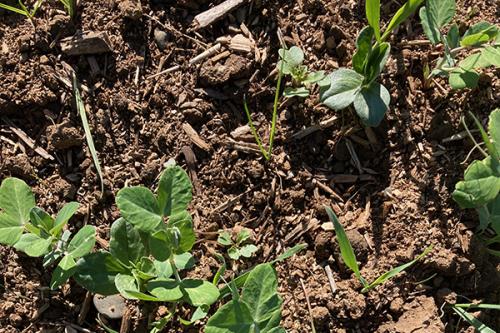
Farm Information
County: Yolo
Location: Solano County. Dixon Ridge
Slope: Flat
Irrigation system: Solid set, full coverage sprinklers
Soil type: Clay loam
Soil detail: Clay loam
Special farming challenges: Initially, some standing water. Class II soils
- Cropping Systems Information
- Crop: walnuts
Acres of orchard or vineyard: 1000Other crops: Tomatoes, wheat, alfalfa, corn, beans, sunflowers
Acres of other crops: 1000
Organic management: No
Certifications: none
Certifications notes: n/a
Where using cover crops: 55 acres of walnuts in CAFF trial - Grower Experience, Farm Priorities, and Cover Cropping Goals
- When started farming (yr): Family started the farm in 1968, current management is 3rd generation, he officially joined the team in 2013.
Farm priorities: Their daily work is a fight to keep a stake in agriculture in their community, and to be a good neighbor. It’s less about preserving open space but more about preserving the opportunity for future generations to participate in agriculture.
Years growing orchard or vineyard crop: 31 years
Years growing cover crops: 2 years
Initial transition to cover cropping: Started with a 3 year CAFF trial in a 55 acre block.
Goals and benefits: Soil improvement, water infiltration/retention
Benefits description: The first priority was to learn. Secondly, improve class 2 soils. The initial cover cropping goal was to improve the soil in these blocks to “something like a class 1.5 soil”.
Change in goals over time: They are sure that the cover crop has improved the soil, but unclear of the extent and the mechanics of the process proved to be more taxing then expected.
Reasons: Ended trial that provided free seeds, unsure if they will continue planting cover crops - Cover Crop Details, Planting and Management Methods
-
Block described here: Walnuts: bearing (Cover Crop Trial Years 2-3)
Current cover crops: Legumes, grasses, insectary mix
Species and mixes: Mow only mix (10% Blando brome, 15% winter ryegrain, 8% persian clover, 8% balsana clover, 10% antas subclover, 10% monti subclover, 9% jester medic, 10% crimson clover, 4% berseem clover, 1% lacy phacelia)
Planting method: Drill seed
Planting date (2020): November. After chandler walnut harvest
Was that optimal? Early November would be ideal, but tough with walnuts due to harvest time. It would create a time crunch if they were cover cropping significant acreage.
Pre-plant soil prep: Cultivate then grain drill, but did not use sprinklers to water in after having too much biomass the year before.
Planting equipment: Grain drill (15ft Land Pride)
Seeding rate: 25-50 lbs/acre
Seeding depth: n/a
Did it germinate well? n/a
Additional management and advice: n/a - Cover Crop Termination Methods and Biomass Management
-
Termination method: Mow
Termination equipment and process: Flail mower
Termination date: March
Was it optimal? Not for the cover crop. They would prefer to let it go to reseed but prioritizes mowing the mummy nuts for navel orangeworm sanitation.
Biomass management: Left in place - Cover Cropping Challenges and Strategies to Address Them
- Challenges: Insect pests and sanitation or nematode issues, termination difficulties, cost, other
Challenges description: Pest sanitation (navel orangeworm), cost, systems logistics and planting timing, not clear enough weed suppresion benefits
Strategies to address challenges: Currently in survival mode economically due to the low walnut prices. Would like to try and grow a reseeding cover crop, but unable to fit that into their navel orangeworm sanitation, where they sweep and mow the mummies in late winter or early spring.
Was the cover crop worth it? n/a
Least successful past cover crops: n/a
